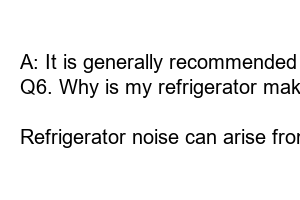냉장고 소음 원인
Title: What’s That Noise? Unveiling the Causes of Refrigerator Noise
Introduction:
Have you ever wondered why your refrigerator makes strange noises? While refrigerators are essential appliances in our daily lives, a noisy fridge can be bothersome and even alarming. In this blog post, we will delve into the causes of refrigerator noise, offering insights into the possible culprits behind those unsettling sounds.
1. Vibration from an Unleveled Fridge:
If your refrigerator is not properly leveled, it can produce unwanted noise. This occurs when the fridge vibrates against the floor or walls, causing irritating sound waves. Ensuring your refrigerator is level and reducing vibration can minimize or eliminate this type of noise.
2. Faulty or Worn Compressor:
The compressor, an integral part of the refrigerator’s cooling system, might be the source of the noise. Over time, compressors can wear down, leading to noisy operation. If you notice clicking, clattering, or humming noises emanating from your fridge, a faulty compressor could be to blame.
3. Noisy Condenser Fan:
The condenser fan, responsible for expelling heat from the refrigerator, can generate noise if it becomes dirty or defective. Obstructions or worn-out bearings can cause the fan to produce rattling or buzzing sounds. Regular maintenance and cleaning of the condenser fan can alleviate this issue.
4. Clogged or Malfunctioning Evaporator Fan:
The evaporator fan, found in the freezer, circulates cool air throughout the refrigerator. If this fan becomes clogged with debris or malfunctions, it can result in unusual noises. Pay attention to any screeching or squealing sounds, which may indicate a problem with the evaporator fan.
5. Faulty Water Valve:
If your fridge has a built-in ice maker or water dispenser, a faulty water valve could be causing the noise. An aging or malfunctioning valve can produce buzzing or humming sounds. Replacing the defective valve will not only solve the noise issue but also prevent leaks and water damage.
6. Loose or Worn Out Components:
Over time, loose or worn out components, such as fan blades, hinges, or mounting brackets, can cause refrigerator noise. A loose fan blade, for example, may result in a buzzing sound. Regular inspection and maintenance can help identify and rectify loose or worn parts.
FAQs:
Q1. Why does my fridge make a loud knocking sound?
A: A loud knocking sound can be an indication of a faulty compressor or an unbalanced refrigerator. However, it’s recommended to consult a professional technician to diagnose the exact cause.
Q2. How can I minimize refrigerator noise in my kitchen?
A: Ensuring proper leveling, regular cleaning of fan components, and scheduling maintenance checks can all contribute to reducing refrigerator noise.
Q3. Is refrigerator noise normal?
A: While some noise is considered normal, loud or persistent noises can indicate underlying issues. Regularly monitor your fridge’s noise level and seek professional assistance if necessary.
Q4. Can refrigerator noise affect its performance?
A: Yes, excessive noise can be a sign of an underlying problem that may impact the fridge’s performance and energy efficiency. Timely maintenance and repairs ensure optimal functioning.
Q5. Should I attempt DIY repairs for refrigerator noise?
A: It is generally recommended to seek professional help for complex issues or repairs involving electrical components. Safety should be a priority.
Q6. Why is my refrigerator making a vibrating sound?
A: A vibrating sound could suggest an unbalanced refrigerator or loose components. Ensure proper leveling and tighten any loose parts to address this issue.
Summary:
Refrigerator noise can arise from various sources, including poor leveling, faulty compressor, noisy fans, and worn-out components. Regular maintenance, cleaning, and timely repairs can help eliminate or minimize unwanted noise, ensuring a peaceful and efficient cooling experience. Remember to consult professionals for complex repairs and prioritize safety throughout the process.

